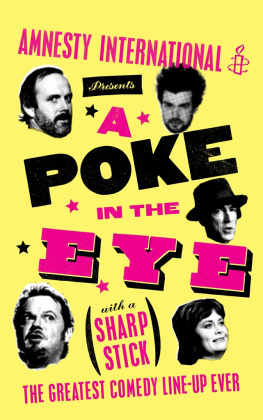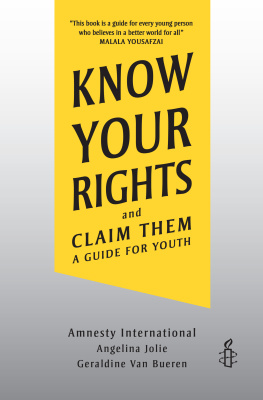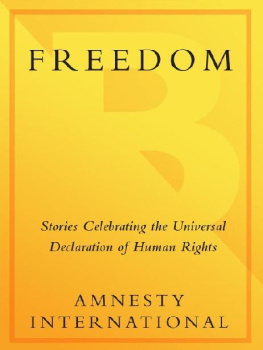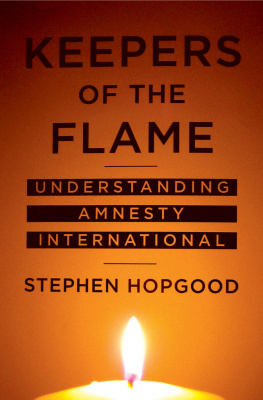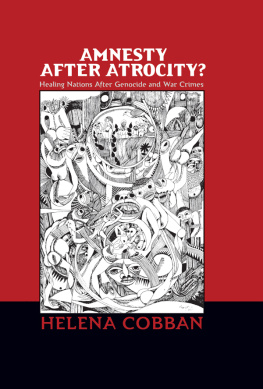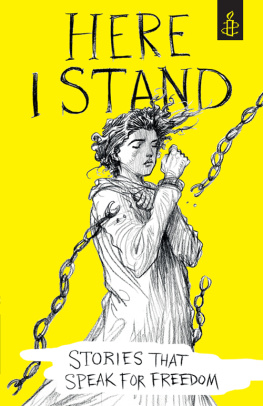Amnesty International - A Poke in the eye ; (With a Sharp Stick)
Here you can read online Amnesty International - A Poke in the eye ; (With a Sharp Stick) full text of the book (entire story) in english for free. Download pdf and epub, get meaning, cover and reviews about this ebook. publisher: Canongate Books, genre: Detective and thriller. Description of the work, (preface) as well as reviews are available. Best literature library LitArk.com created for fans of good reading and offers a wide selection of genres:
Romance novel
Science fiction
Adventure
Detective
Science
History
Home and family
Prose
Art
Politics
Computer
Non-fiction
Religion
Business
Children
Humor
Choose a favorite category and find really read worthwhile books. Enjoy immersion in the world of imagination, feel the emotions of the characters or learn something new for yourself, make an fascinating discovery.
- Book:A Poke in the eye ; (With a Sharp Stick)
- Author:
- Publisher:Canongate Books
- Genre:
- Rating:3 / 5
- Favourites:Add to favourites
- Your mark:
- 60
- 1
- 2
- 3
- 4
- 5
A Poke in the eye ; (With a Sharp Stick): summary, description and annotation
We offer to read an annotation, description, summary or preface (depends on what the author of the book "A Poke in the eye ; (With a Sharp Stick)" wrote himself). If you haven't found the necessary information about the book — write in the comments, we will try to find it.
A Poke in the eye ; (With a Sharp Stick) — read online for free the complete book (whole text) full work
Below is the text of the book, divided by pages. System saving the place of the last page read, allows you to conveniently read the book "A Poke in the eye ; (With a Sharp Stick)" online for free, without having to search again every time where you left off. Put a bookmark, and you can go to the page where you finished reading at any time.
Font size:
Interval:
Bookmark:

First published in Great Britain in 2012 by Canongate Books Ltd,
14 High Street, Edinburgh EH1 1TE
www.canongate.tv
Routines copyright Amnesty International
Foreword copyright Amnesty International
Introductions copyright Graham McCann
The moral right of the authors has been asserted
We have made every effort to trace copyright holders and obtain their permission for the use of copyright material. Amnesty and the publisher apologise for any errors or omissions and would be grateful if notified of any corrections that should be incorporated in future reprints or editions of this book.
British Library Cataloguing-in-Publication Data
A catalogue record for this book is available on
request from the British Library
ISBN 978 0 85786 734 6
eISBN 978 0 85786 735 3
Designed and typeset by Cluny Sheeler, Edinburgh
This digital edition first published in 2012 by Canongate Books


As a human rights organisation, we hadnt yet celebrated our fifteenth birthday when A Poke in the Eye (With a Sharp Stick), the first of the three shows that began the sequence of Secret Policemans Balls, was staged over three nights at Her Majestys Theatre in London in April 1976.
The idea of fundraising for Amnesty by putting on anarchic evenings of comedy sketches a cross between a Beyond the Fringe-style revue and a night of stand-up was hatched the previous year by Amnesty Internationals then assistant director Peter Luff and John Cleese, star of the comedy hit of the decade, Monty Pythons Flying Circus, and of that years new TV sensation, Fawlty Towers. Luff had asked Cleese, an Amnesty supporter, if he had any fundraising ideas, and Cleese suggested hed arrange a comedy benefit gig featuring a few pals. They turned out to be the cream of UK comedy talent, including most of the Python team, Peter Cook, Alan Bennett and Jonathan Miller from Beyond the Fringe, Eleanor Bron and Dame Edna Everage (aka Barry Humphries). It all came about with a kind of happy serendipity and it happened at a crucial time in Amnestys history.
The Amnesty story began in November 1960 with the personal outrage of an English lawyer called Peter Benenson. He told of reading a newspaper article about two Portuguese students who, in a Lisbon bar one evening, raised a toast to freedom. Students often do things they regret in pubs, but toasting freedom isnt usually one of them. Under Antonio Salazars regime, however, they were reported to the authorities and sentenced to seven years in prison. The regimes absurd response to this so-called crime moved Benenson to write an article in the Observer newspaper called The Forgotten Prisoners. Published in May 1961, it urged readers to write letters on behalf of prisoners of conscience those imprisoned simply for peacefully expressing their political, moral or religious beliefs throughout the world. Benensons appeal sparked an international grassroots campaign to protect human rights, and Amnesty International was born.
The new organisation quickly built a reputation for meticulous research, political neutrality and impartiality, and this gave Amnesty a moral authority that meant we were listened to even by those who would rather not hear what we had to say. By 1976, thousands of prisoners had been released, in whole or in part because of pressure from Amnesty. Our annual report, a detailed country-by-country summary of the human rights situation around the world, was recognised by governments and organisations such as the United Nations. And we broadened our agenda to include campaigns on specific issues such as torture and the death penalty in recognition of the fact that human rights abuses against individuals would continue to proliferate until such practices were outlawed everywhere. As our public profile grew, so too did international recognition. In 1977, the organisation was awarded the Nobel Peace Prize for our work against torture and for having contributed to securing the ground for freedom, for justice, and thereby also peace in the world.
Throughout our fifty-year history, Amnesty has grown, developed and changed in response to global challenges, consistently promoting all the rights enshrined in the Universal Declaration of Human Rights while campaigning on specific abuses. From our early focus on prisoners of conscience and political prisoners in the Cold War era, we have increasingly exposed other forms of cruelty and oppression (for instance, at one point researchers concluded that there were no political prisoners in Guatemala, only political killings). Disappearances, control of the arms trade, poverty, discrimination of all kinds and corporate responsibility have all become part of our human-rights campaign agenda, as have abuses connected with the rise of armed conflicts mass killings, widespread displacement of people, the use of child soldiers and the unchallenged impunity of mass abusers. We also find constructive ways of working with other organisations and grassroots movements; for example, Amnestys campaign to end violence against women produced effective joint actions with local womens groups all over the world. Individual casework remains the backbone of our work, reminding us always that the concept of human rights is not abstract it is about real people.
The Secret Policemans Balls have been part of this journey. In the first fifteen years, Amnestys principles, purpose and practices were clear and well developed. By the time of the first show, we had approximately 70,000 individual members in sixty-five countries, with some 1,600 active Amnesty campaigning groups in thirty-three countries. The organisation was highly respected by governments, campaigners and everyone concerned with protecting human rights. But to become even more effective and to put human rights at the forefront of the worldwide conversation, Amnesty needed to reach out to the millions of potential supporters who were not already committed human rights activists. The UK comedy fundraisers proved a surprisingly good vehicle.
Is there a contradiction between the deadly serious work that we are engaged in, and the laughter generated by the Secret Policemans Ball? Many of the prisoners of conscience we try to defend spend years in prison, sometimes in horrific conditions. Many are tortured or otherwise abused. Some are murdered or simply disappear. Theres nothing remotely funny about what happens to these people. Yet the Secret Policemans Balls are all about laughter the more of it the better! The Private Eye editor and Have I Got News For You star Ian Hislop once described feeling that humour and Amnesty are unlikely bedfellows after announcing the winners at an Amnesty Media awards ceremony. How, he wondered, is it possible to laugh about things such as torture and the death penalty? I went on stage following a catalogue of extremely distressing reports of human rights abuses. It didnt seem the ideal time to make such a joke, but I felt obliged because one of the winning entries had contained such a good joke that it would have been unfair not to pass it on. It was about a secret policeman who was ordered to catch a lion in the desert. This seemed an impossible task until the policeman revealed his secret. He would catch a rabbit and force it to confess it was a lion. The audience loved the joke. He said, This is black humour, gallows humour, even, but it does indicate that even in the worst of circumstances people want to laugh and that laughter has the power to make them feel better.
Next pageFont size:
Interval:
Bookmark:
Similar books «A Poke in the eye ; (With a Sharp Stick)»
Look at similar books to A Poke in the eye ; (With a Sharp Stick). We have selected literature similar in name and meaning in the hope of providing readers with more options to find new, interesting, not yet read works.
Discussion, reviews of the book A Poke in the eye ; (With a Sharp Stick) and just readers' own opinions. Leave your comments, write what you think about the work, its meaning or the main characters. Specify what exactly you liked and what you didn't like, and why you think so.

